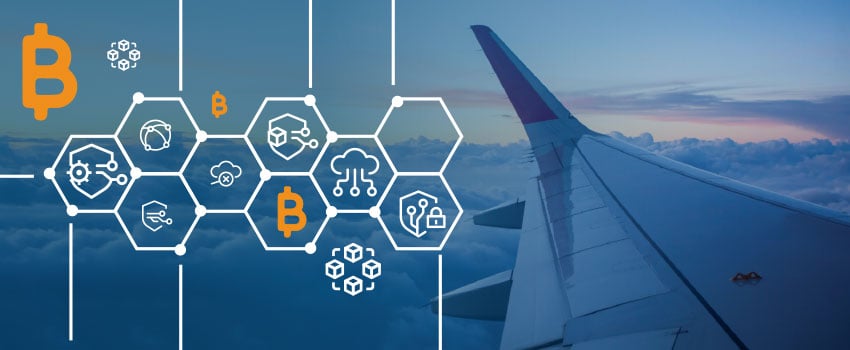Airlines - which can span globally - currently have many systems that are in play which deal with a vast amount of data that they create, collect and hold. However, this data can become isolated in silos and when that data needs to be exchanged, it is not always a smooth transition - which can affect document management processes. Not only does this affect operational integrity when something goes wrong, but also the safety and security of both the data and the organisation too.
Therefore, the idea of being able to wirelessly connect mobile devices through one centralised network can be beneficial for creating smoother transitions of data to the right people at the right time; and can also free up employees from being required to physically and/or electronically store aircraft documents and manuals and more.
And that’s just the cloud.
Blockchain is another hot topic that airlines such as Air New Zealand, Lufthansa and Russian carrier S7 have been keen to explore. Blockchain technology is essentially a decentralised way of maintaining records and data using a peer-to-peer network which claims to be incorruptible and unhackable - which is great news for airlines in ensuring their data is both secure and compliant.
Though Blockchain for the aviation industry is still in its infancy, in this article we discuss five possibilities that Blockchain technology can have for airlines in the near future.
1. e-Tickets
Blockchain technology would be able to tokenise e-tickets - which, by their nature are already a dematerialised version of a traditional paper ticket and stored in a database. Blockchain can be used to determine how the ticket is sold and used by using smart contracts alongside logic, terms & conditions, and policy.
2. Security and Identity Protection
For airlines specifically, protecting data and important operational documents such as flight operations manuals and technical documentation is one of the highest priorities. They must demonstrate that they comply with various data protection and regulator rules along with other legislation as well as being protected against any potential security implications. With the addition of Blockchain, however, it can help strengthen the security of the data and can help manage and share the information using monitored and controlled authorisation access.
3. Aircraft Maintenance & Document Management
Currently, aircraft maintenance logs and other aircraft documents such as flight manuals and OEM data can be stored electronically in multiple formats, or even still in physical paper form. Blockchain technology could help transform this data and provide an immutable copy of every aspect of the plane, from the beginning of its existence and could include:
- What maintenance was required
- Maintenance undertaken
- Maintenance revisions
- Maintenance authorisations etc.
The visibility of this information can really improve maintenance, safety, compliance and security practices across the organisation.
4. Loyalty Schemes
It goes without saying, loyalty schemes are incredibly popular programmes for airlines to provide their customers. Traditionally, customers need to accrue their points before they can be allowed to use them and are often limited to what and how they can spend them.
By utilising Blockchain technology, loyalty points can be tokenised instantly and customers can redeem them straight away - and this can also open up opportunities for airlines to increase their ancillaries offerings using one easy-to-use platform in which they can spend their points - further improving loyalty. Singapore Airlines is one such airline that is currently exploring the Blockchain potential for their frequent flyer spending.
5. Secure Connectivity
Blockchain could help strengthen the cybersecurity of connecting the aviation supply chain. The chain itself can consist of several businesses including:
- Tier 1 suppliers
- Airlines
- Airports
- Third-party MRO providers
- OEMs
These businesses require secure channels that can allow them to communicate their data to and from each party as well as simultaneously protecting that data exchange across the chain. Blockchain can record blocks of data, which is time-stamped and encrypted through its peer-to-peer network - ensuring that data is fully protected from any tampering, corruption or breaches.
Innovative Possibilities
It’s clear to see why airlines are opening themselves up to new and innovative possibilities when faced with the threat of cyber attacks, loss or corruption of data, meeting compliance and regulatory demands as well as improving and protecting operational data such as their flight documents and manuals. With legacy systems becoming more inflexible over time, and with airline systems requiring a more agile environment for their data, technology such as the cloud and emerging technology such as Blockchain are slowly being embraced.
While Blockchain is still being explored, there remains proven technology like the cloud available to improve your airline’s processes such as document management which can help improve the efficiency, safety and compliance of your organisation.
Image by erika Envato

